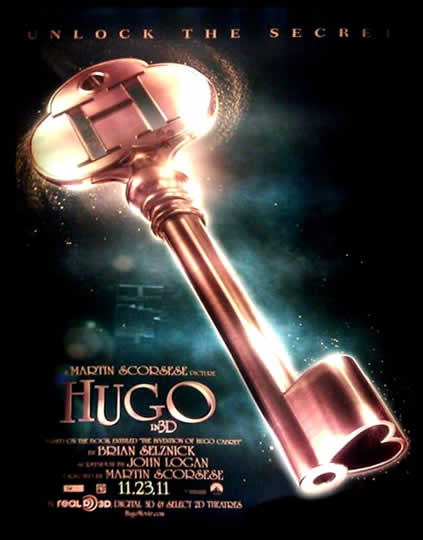For me, an imperfect film by Scorsese often tops a near perfect film by most other directors. Based on Brian Selznick’s illustrated novel “The Invention of Hugo Cabret”, Scorsese has directed one of three magnificent 3-d movies. “Avatar”, “Coraline” and “Hugo” are films that MUST BE seen in 3D. Each weaves the dimensionality into the emotional thrust of the film, the story arc, instead of treating the technique as a special effect.
 A simple thing like a walk in the snow is a marvel in Scorsese’s hand. His views of Paris from the rooftop are unforgettable and the chase through the impossible tower of clockworks and warrens of apartments hidden inside the Train Station walls is wonderful fun.
A simple thing like a walk in the snow is a marvel in Scorsese’s hand. His views of Paris from the rooftop are unforgettable and the chase through the impossible tower of clockworks and warrens of apartments hidden inside the Train Station walls is wonderful fun.
In one scene Hugo and Isabelle sneak into a cinema and watch Harold Lloyd cling to a skyscraper clock in “Safety Last!” and later Hugo does the same stunt to elude the rabid Station Inspector played by the consummate Sacha Baron Cohen. Perhaps having Baron Cohen and Kingsley in the same film only points up Kingsley’s failure of imagination. Baron Cohen is nothing if not inventive. As the resentful former orphan with a mechanical prosthetic leg and vast insecurities, he milks every physical and emotional nuance. His voice is a solo instrument wheedling a variety of tones for a character who’s spent his life controlling his emotions until he blows his stack.
Cons. I have enjoyed Ben Kingsley in roles like “Sexy Beast” where he plays a variety of Brit he may know from life; in the thinly written role of George Méliès he’s coasting. He attacks the young Méliès, during the heyday of his fantastic career, with gusto, but fails to add the inventive character quirks that would have made the older Méliès more than a figurehead OR cipher. Because he’s curiously flat in the role, the sentimental triumph of the end of the film swirls around him and left me unsatisfied.
Scorsese, fueled by a ferocious intelligence and ambitious film craft creates detailed, layered films of classical splendor, but even he has blind spots. Scorsese makes some strange casting choices in his smaller roles. (In ‘The Aviator”, I couldn’t believe that the same man who cast the brilliant Kate Blanchett as Kate Hepburn would cast the buffed, wiry Kate Beckinsale as the plush screen goddess Ava Gardner, or the brittle Gwen Stefani as the effervescent Jean Harlow. If the roles were throwaway, why not cast unknowns with body types that evoked the iconic old school glamour girls. Ouch!)
I like the idea of the background romance between the dog-loving spinster Madame Emilie (Frances de la Tour) and her would be suitor Monsieur Frick. But diffident Richard Griffiths seems lost in the role, a poor mans S.Z. “Cuddles” Sakall with none of the ebullience the role needs to be memorable.
Expressive young actors Asa Butterfield (“The Boy in the Striped Pajamas”) as the orphaned Train Station stowaway Hugo Cabret and Chloë Grace Moretz (“(500) Days of Summer “) as bibliophile Isabelle are sheer delight, with their clipped speech and Euro manners. (She’s a Southern girl and must have worked with a coach, he’s a young British actor.)
Ray Winstone is sufficiently evil as Hugo’s drunkard Uncle Claude. Jude Law charms as Hugo’s idealistic clock making Father, Christopher Lee gives an inflected performance as the kindly, restrained bookseller Monsieur Labisse
Helen McCrory (Narcissa Malfoy in the “Harry Potter” franchise) is affecting as Mama Jeanne (Méliès’ muse wife) and beguiling in the flashbacks. Michael Stuhlbarg relishes his role as Méliès’ greatest fan and collector ReneTabard.
If Scorsese’s recreation of a shooting day at Méliès’ famed all glass movie studio were all, the movie would be a must see, but his adaptation of Selznick’s book is a joy.

